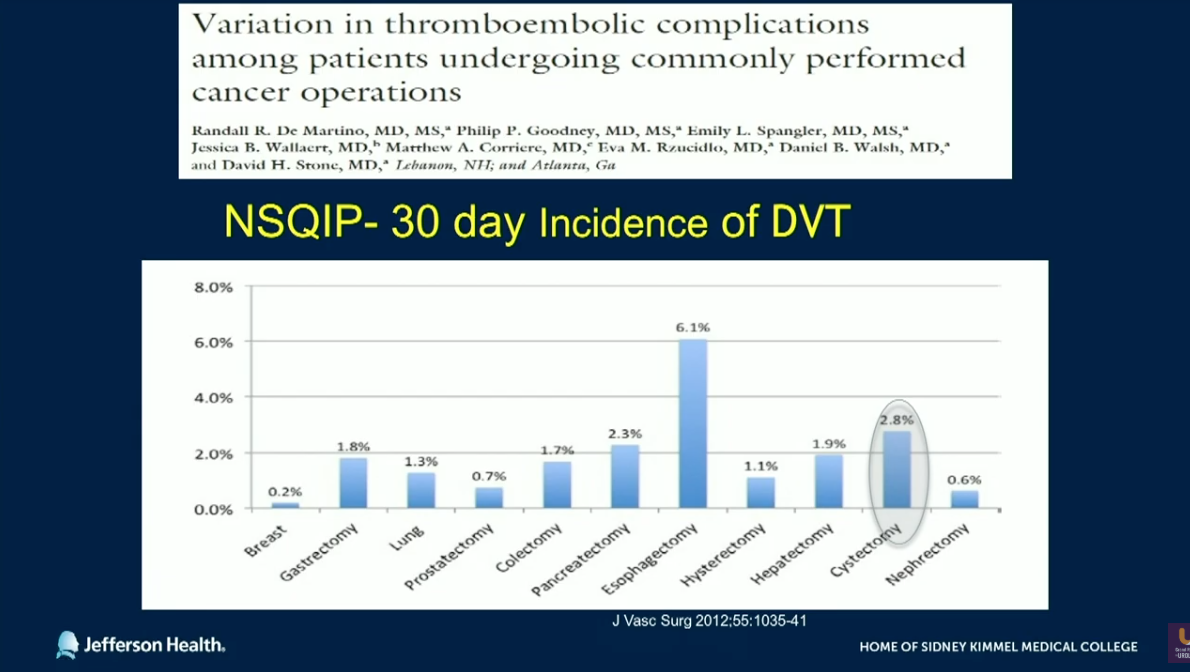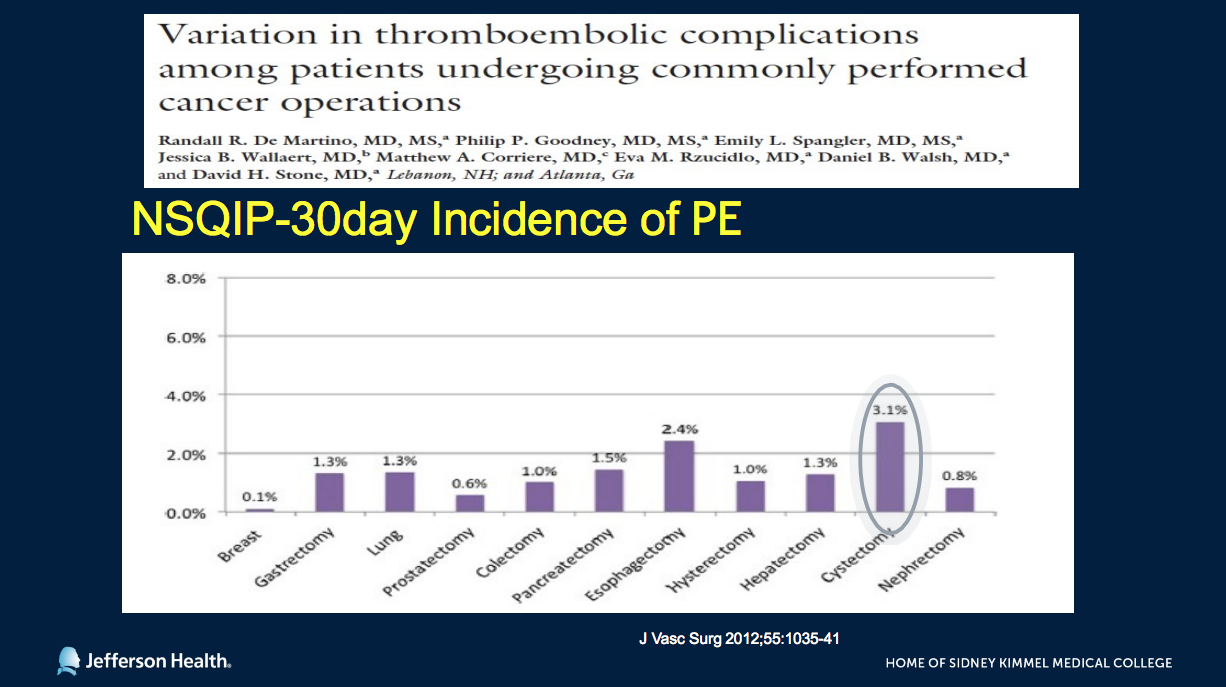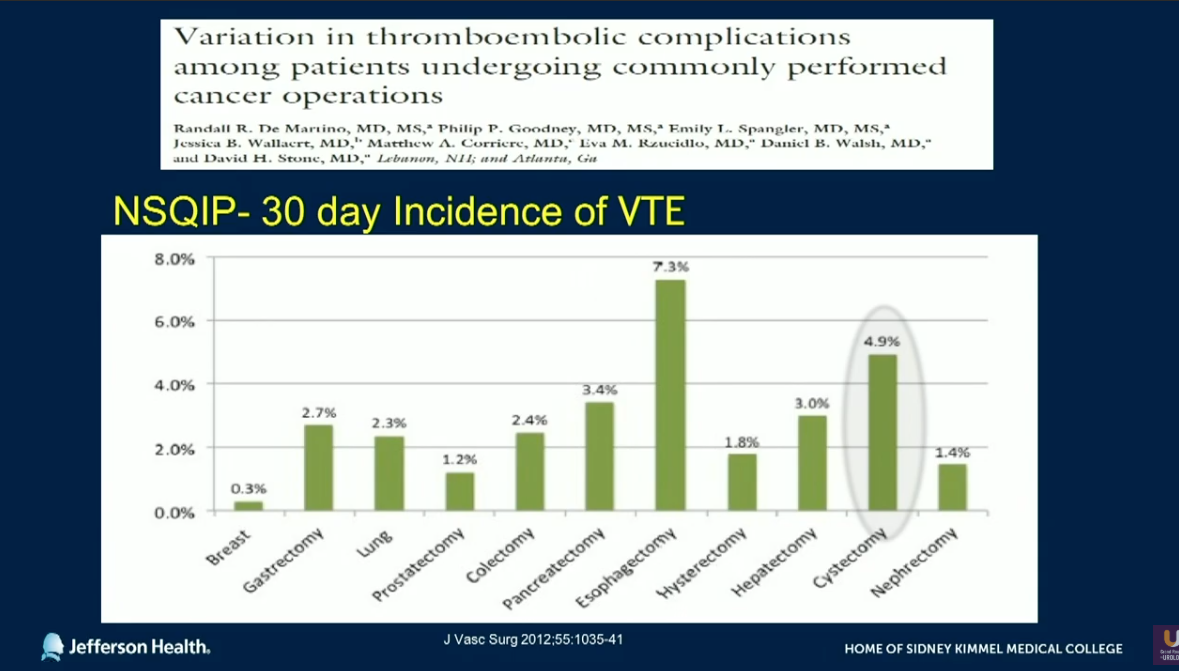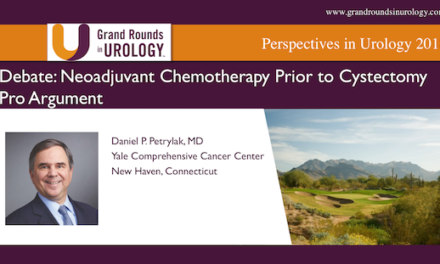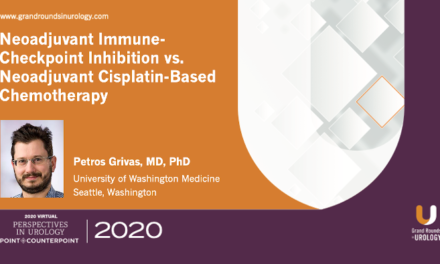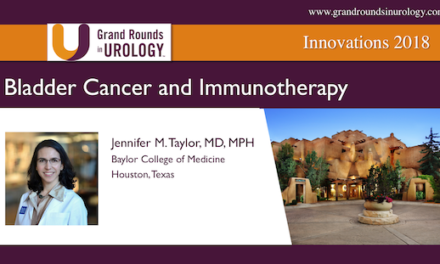Leonard G. Gomella, MD, presented “Thromboembolic Complications in Bladder Cancer” during the 3rd Annual International Bladder Cancer Update on January 23, 2019 in Beaver Creek, Colorado.
How to cite: Gomella, Leonard G. “Thromboembolic Complications in Bladder Cancer” January 23, 2019. Accessed Dec 2024. https://dev.grandroundsinurology.com/thromboembolic-complications-in-bladder-cancer-2/
Thromboembolic Complications in Bladder Cancer – Summary:
Leonard G. Gomella, MD, FACS, discusses the highly thrombogenic nature of bladder cancer and the burden of thromboembolic complications in patients undergoing radical cystectomy. He then reviews optimal methods and duration of prophylaxis to reduce the risk of these complications.
Abstract:
Radical cystectomy is a complex, extirpated operation that violates two organ systems. The procedure has alarming rates of complications and 90-day mortality, readmissions, and costs. Furthermore, there have been no significant changes in rate, type of, or severity of 30-day radical cystectomy-related since 2010.
Of these complications, bladder cancer patients are particularly susceptible to thrombogenic events due to disease-related factors that induce hypercoagulability, common bladder cancer patient characteristics, and consequences of treatments. Because of these factors, cystectomy ranks second in the incidence of deep venous thrombosis (DVT) and venous thromboembolism (VTE) among commonly performed cancer operations. It also ranks first in pulmonary embolism (PE).
Evidence shows that the use of robotic robot-assisted radical cystectomy rather than open radical cystectomy leads to little improvement rates of PE and VTE complications. Similarly, studies have shown little benefit to using Enhanced Recovery After Surgery (ERAS) protocols in radical cystectomy complications. However, methods that could decrease the risk of these complications include perioperative chemoprophylaxis and compression boots, early ambulation, and extending DVT prophylaxis beyond patient discharge. Options for perioperative parenteral anticoagulation include unfractionated heparin and low molecular weight heparins.
This presentation discusses safety, efficacy, and cost of extended prophylaxis, as well as optimal duration of VTE prophylaxis, specifically if it should extend longer than 4 weeks post-cystectomy. The conversation also covers the risk of arterial thromboembolism (ATE) in patients undergoing cystectomy, and the impact of neoadjuvant chemotherapy on thromboembolic events.
About the International Bladder Cancer Update
The International Bladder Cancer Update (IBCU) is an annual one-day CME conference focused on bladder cancer treatment updates. IBCU takes place during its sister conference, the International Prostate Cancer Update (IPCU). The conference’s faculty consists of international experts, and the event caters to urologists, urologic oncologists, and other healthcare professionals. In addition to didactic lectures, IBCU features interactive discussions, a panel roundtable, debates, and case presentations. Dr. Gomella presented this lecture during the 3rd IBCU in 2019. Please visit this page in order to learn more about future IBCU meetings.
ABOUT THE AUTHOR
Leonard Gomella, MD, FACS, is the Bernard W. Godwin, Jr., Professor of Prostate Cancer and Chairman of the Department of Urology at the Sidney Kimmel Medical College of Thomas Jefferson University. He joined the Jefferson faculty in 1988 and was appointed Chair in 2002. He serves as Senior Director for Clinical Affairs for the NCI-designated Sidney Kimmel Cancer Center, Clinical Director of the SKCC Network, and Urology Chair for NRG (RTOG). Dr. Gomella is involved in translational basic science and clinical research in the development of new diagnostic techniques and treatments for prostate and bladder cancer through the Sidney Kimmel Cancer Center as Co-Leader of the Biology of Prostate Cancer Program. In 1992, he led the team that first used molecular techniques to detect circulating tumor cells in prostate cancer. He has given over 500 presentations, written over 400 papers, and edited dozens of chapters and monographs in the field of urology. Dr. Gomella has authored and edited many editions of a number of books for medical students, residents, and practicing physicians, including the “Clinician’s Pocket Reference” (aka “The Scut Monkey Book”) and “Five Minute Urology Consult.” He is also Editor-in-Chief of the Canadian Journal of Urology. “Recovering from Prostate Cancer,” which Dr. Gomella wrote in 1993, was the first book released for the general public specifically on the topic of prostate cancer.
“Best Doctors in America,” “Top Doctors for Cancer,” and Philadelphia Magazine’s “Top Doctors” have recognized him for many years for his contributions to urologic oncology and prostate cancer care. He also received national recognition in Newsweek in 2015. In 2007, Men’s Health listed Dr. Gomella as one of the 20 top urologists in the US. He has received numerous awards, including the American Cancer Society’s “Volunteer Achievement Award” and an “NCI Achievement Award.” He has been President of the Mid-Atlantic Section of the AUA and has been elected to the American Association of Genitourinary Surgeons and the prestigious Clinical Society of Genitourinary Surgeons. The University of Kentucky College of Medicine awarded him a “Distinguished Alumnus Award” in 2009. From 2015-2017, he was President of the Society of Urologic Oncology. In 2015, he received a “Distinguished Contribution Award” from the AUA and Jefferson honored him with the “Jefferson Achievement Award in Medicine.”

